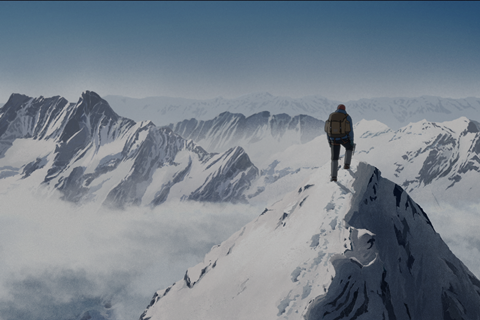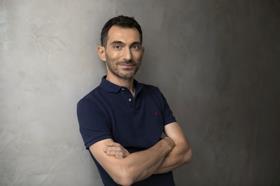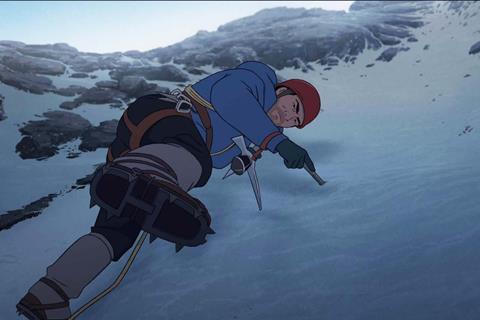Adapted from a Japanese manga series, French animation The Summit Of The Gods delves into the legend of an early attempt to scale Mount Everest. Screen talks to writer/director Patrick Imbert about bringing an outsider perspective to the project.

Immersive, emotive and stunningly atmospheric, The Summit Of The Gods is a hand-drawn animated film that recreates the scale, splendour and savageness of Mount Everest while investigating what drives people to try and scale its peak. Yet its director and co-writer Patrick Imbert would never count himself among those who dream of conquering the mountain. In fact, when the French animator first read Jiro Taniguchi’s manga, on which the movie is based, mountain climbing was not among his passions.

“I like to walk in the mountains, but only in summertime — and not in the summits,” says Imbert. He admits to knowing little about mountaineering before the five-
volume comic series (itself based on a 1998 novel by Japan’s Baku Yumemakura) was passed to him by Jean-Charles Ostorero — who had secured the rights for Julianne Films — and Didier Brunner, head of celebrated Parisian animation house Folivari. “But hopefully you don’t have to know a subject professionally before doing a movie on it. The guys that did Star Wars, they didn’t pilot any spaceships…”
When producers Ostorero and Brunner first approached Imbert about The Summit Of The Gods, it was not with an invitation to write or direct. At the time, he was collaborating with Benjamin Renner on 2017 family-friendly animated anthology feature The Big Bad Fox And Other Tales. Familiar with Imbert from his work as an animation supervisor on films including Ernest & Celestine and April And The Extraordinary World, Ostorero and Brunner simply requested he create some character design concepts. But they were impressed with the results and, over time, drew Imbert closer to the project.
“They already had a script,” says Imbert, “but Jean-Charles kept asking, ‘What do you think about this? And this?’ I had to say that, honestly, I did not think it was the right way to adapt the manga. He said, ‘Oh really? What do you propose?’ I said, ‘Just give me two days…’”
The resulting four-page outline focused purely on the parallel stories of an obsessive, haunted mountain climber named Habu, and similarly obsessive journalist Fukamachi. The latter believes Habu has evidence that Everest was actually summited in 1924 — almost three decades before Tenzing Norgay and Edmund Hillary — by George Mallory and Andrew Irvine, who perished near the peak. Ostorero was so impressed, he invited Imbert to start from scratch with the script (which he did in collaboration with Magali Pouzol, co-writer of animated historical drama Funan), and also to direct. “This is not the way to be a director,” laughs Imbert. “I was not supposed to be a director!”
Visually and thematically, The Summit Of The Gods could not be more different from The Big Bad Fox And Other Tales (which won the best animated feature César). It is steeped in realism, and is a resolutely adult story. “I was kind of fed up with kids’ stuff,” Imbert reveals of his decision to accept the producers’ offer. Despite being compared with the films of Hayao Miyazaki and Isao Takahata, Imbert insists that, as much as he loves anime, it was not his prime source of inspiration.
“You say the film is anime-like, but I’m not sure many Japanese people would agree,” he says. “If you watch a Studio Ghibli movie, the sky is blue and the trees are really green. But in The Summit, when we do a sky it’s not automatically blue. My main influences don’t come from animation, but from live-action movies and photography. We looked at the colour films of Ozu, the work of cinematographer Emmanuel Lubezki on The Revenant, and the photos of Raymond Depardon.”
Expert input

While there were no field trips to the Himalayas (“We visited Everest through Google Street View,” laughs Imbert), he did recruit climber Vincent Vachette, who summited Everest in 2016, to share his experiences. “He helped me to understand what people feel up there, and he inspired some scenes in the movie,” says Imbert. One of those scenes was a memorable moment where Fukamachi and Habu are huddled in a tent on a narrow ledge, with the wind monstrously howling and buffeting the canvas. “He said, ‘You never see this in the movies, but it’s how you feel when you’re there.’”
To ensure every technical detail was accurate, Imbert invited French Alpine Club member Charlie Van Der Elst to bring his equipment to the studio: rope, pitons, carabiners… “He threw the rope up to the mezzanine and was hanging from there, so we took a lot of pictures. It was helpful for all the technical gestures. We could not just animate anything; it had to be very precise.”
With all this detail and authenticity, it may seem surprising that the original cut of The Summit Of The Gods — unveiled at Cannes Film Festival in July 2021 and released into French cinemas via Diaphana Distribution in September — features Japanese characters speaking French. “We did it in French because I am French and I write the dialogue,” explains Imbert. “I keep changing things until the end, so I need to work in French. I would not be able to do the same work in English.” Netflix, which in August acquired rights outside France, Benelux, China, Japan and South Korea, now offers an English dub on its own platform.
In December, The Summit Of The Gods was rewarded with an Annie nomination for best animated independent feature, alongside fellow awards hopefuls including Jonas Poher Rasmussen’s Flee and Mamoru Hosoda’s Belle. Now that the film is at the end of its journey, has the long process of making and releasing The Summit Of The Gods given Imbert deeper insight into what drives people to suffer the extreme conditions at Everest’s peak?
“No,” he laughs. “In doing this movie I’ve learned it’s very difficult to do a movie! For me, this movie is not about a mountain. It’s about cinema. The mountain is the context, and I have to treat it well. But my main interest is cinema.”
























No comments yet